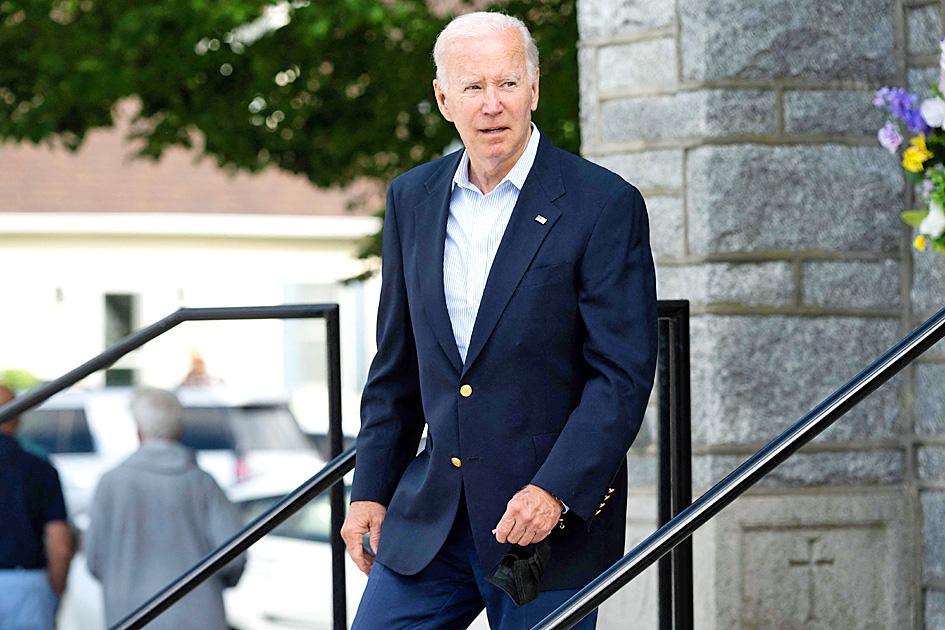US President Joe Biden on Saturday said he would be talking to Chinese President Xi Jinping (習近平) “soon,” and is weighing possible action on US tariffs on China that were imposed by the administration of former US president Donald Trump.
Asked whether he had decided to lift any of the tariffs, Biden said: “We’re in the process of doing that... I’m in the process of making up my mind.”
Biden’s administration is weighing what to do about Trump’s tariffs on about US$300 billion of goods imported from the US economy’s biggest competitor. While some businesses have benefited from protection from Chinese imports, companies that use the goods as inputs in areas including manufacturing have been hurt.

Photo: AFP
US Secretary of the Treasury Janet Yellen last week told lawmakers that the Biden administration is looking to “reconfigure” the tariffs and said that they were contributing to higher prices for goods with US inflation running at the hottest pace in 40 years.
Biden declined to say when he would talk to Xi, saying only: “I’m going to be talking to him.”
US officials are working to set up a possible call this summer as tensions run high between the world’s two biggest economies, including on Taiwan, Ukraine and human rights matters.
One person familiar with planning said a potential summer call could come as soon as next month, but any in-person meeting of the two leaders would wait until after the China’s National Party Congress later in the year.
Xi, who is seeking to secure a third term, has also halted international travel since COVID-19 emerged more than two years ago.

EUROPEAN TARGETS: The planned Munich center would support TSMC’s European customers to design high-performance, energy-efficient chips, an executive said Taiwan Semiconductor Manufacturing Co (TSMC, 台積電), the world’s largest contract chipmaker, yesterday said that it plans to launch a new research-and-development (R&D) center in Munich, Germany, next quarter to assist customers with chip design. TSMC Europe president Paul de Bot made the announcement during a technology symposium in Amsterdam on Tuesday, the chipmaker said. The new Munich center would be the firm’s first chip designing center in Europe, it said. The chipmaker has set up a major R&D center at its base of operations in Hsinchu and plans to create a new one in the US to provide services for major US customers,

The Ministry of Transportation and Communications yesterday said that it would redesign the written portion of the driver’s license exam to make it more rigorous. “We hope that the exam can assess drivers’ understanding of traffic rules, particularly those who take the driver’s license test for the first time. In the past, drivers only needed to cram a book of test questions to pass the written exam,” Minister of Transportation and Communications Chen Shih-kai (陳世凱) told a news conference at the Taoyuan Motor Vehicle Office. “In the future, they would not be able to pass the test unless they study traffic regulations

GAINING STEAM: The scheme initially failed to gather much attention, with only 188 cards issued in its first year, but gained popularity amid the COVID-19 pandemic Applications for the Employment Gold Card have increased in the past few years, with the card having been issued to a total of 13,191 people from 101 countries since its introduction in 2018, the National Development Council (NDC) said yesterday. Those who have received the card have included celebrities, such as former NBA star Dwight Howard and Australian-South Korean cheerleader Dahye Lee, the NDC said. The four-in-one Employment Gold Card combines a work permit, resident visa, Alien Resident Certificate (ARC) and re-entry permit. It was first introduced in February 2018 through the Act Governing Recruitment and Employment of Foreign Professionals (外國專業人才延攬及雇用法),

‘A SURVIVAL QUESTION’: US officials have been urging the opposition KMT and TPP not to block defense spending, especially the special defense budget, an official said The US plans to ramp up weapons sales to Taiwan to a level exceeding US President Donald Trump’s first term as part of an effort to deter China as it intensifies military pressure on the nation, two US officials said on condition of anonymity. If US arms sales do accelerate, it could ease worries about the extent of Trump’s commitment to Taiwan. It would also add new friction to the tense US-China relationship. The officials said they expect US approvals for weapons sales to Taiwan over the next four years to surpass those in Trump’s first term, with one of them saying